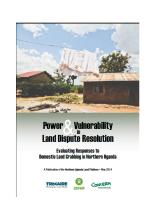/ library resources
Showing items 1 through 8 of 8.The nature and significance of China's engagements with African agriculture continues to be hotly debated in the media, academia and policy circles around the world.
The ways in which people obtain land in Uganda are changing fast. Land that used to be secured through inheritance, gifts or proof of long-term occupancy is now more commonly changing hands in the market.
Unfolding analysis reveals two types of land disputes prevalent in postwar northern Uganda: cases that involve a legitimate cause of action and those that do not.1 Since mediation and alternative forms of dispute resolution rely on parties’ willingness to negotiate in good faith, cases featuring
Post-conflict northern Uganda has witnessed an increase in disputes over land. This has, to a great extent, been as a result of the armed conflict and its aftermath.
Since Karamoja is richly endowed with gold, marble, iron ore, tungsten, limestone, oil and gas, it has attracted many investors, in particular since the protracted armed conflicts in northern Uganda started fading away.
This paper examines the evolution and the nature of the current forms of land tenure in Masindi District and the extent to which these forms impair or facilitate positive socio-economic changes.
This guide has been written as an information resource for government officials, community leaders, humanitarian aid workers, judges, lawyers and others whose responsibilities include upholding land and property rights in Uganda.
Access to land is at the heart of rural livelihoods. In sub-Saharan Africa, the pace and scale at which land is changing hands are increasing fast.
Land Library Search
Through our robust search engine, you can search for any item of the over 73,000 highly curated resources in the Land Library.
If you would like to find an overview of what is possible, feel free to peruse the Search Guide.







